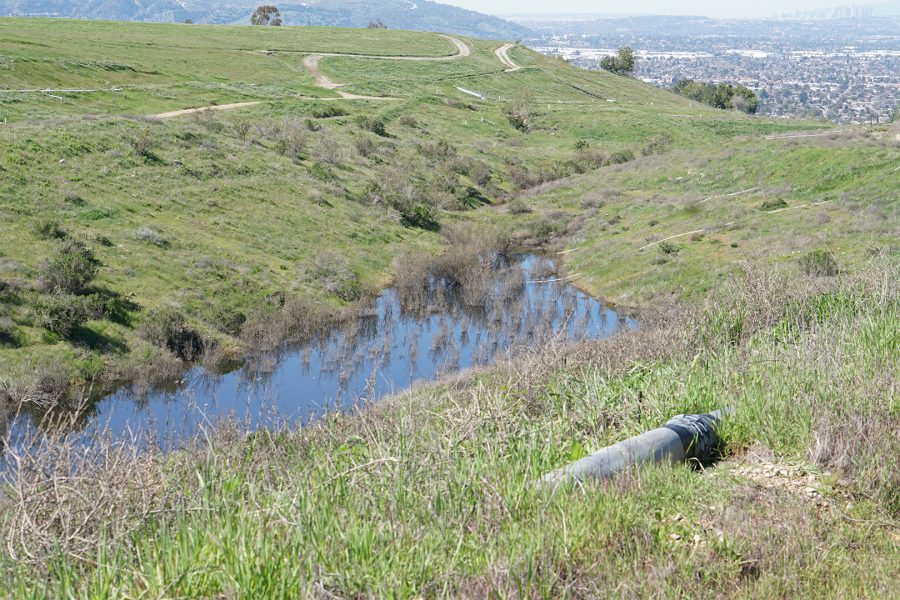While many West Covina residents have wondered what the next steps are for the former BKK property and the proposed Singpoli project, the Department of Toxic Substances Control has told the city that they need to have a talk.
In a letter addressed to city manager David Carmany on Jan. 30, DTSC told the city that the BKK land is still a hazard and that Singpoli’s investigations may be intrusive to DTSC’s monitoring and upkeep of the site. The letter, written by Chief Dan Ziarkowski of the Legacy Landfills Office – BKK unit, specifically focuses on the access roads and how Singpoli’s vehicles may congest or stop the flow of vehicles on the access road. They had previously received a letter about Singpoli potentially preventing access to some of their contamination-monitoring wells on Oct. 22 of the previous year.
While the city is looking to push the liability off to Singpoli, DTSC stated that the city’s agreements with Singpoli in its “Access Agreement” and “Purchase Agreement” do not address existing land use restrictions.
This means the city is still obligated to those restrictions, alongside a reminder that DTSC is in charge of enforcing those restrictions.
DTSC refers to this as an omission that “demonstrates the need for increased coordination between the city and DTSC regarding access to the BKK Facility.”
The first agreement, which regards access, will allow Singpoli to conduct “any invasive or Phase II inspections on city property” without further notice to the city or DTSC—as the agreement only requires Singpoli to be in contact with the site owner, the BKK Corp. These “intrusive” inspections would not only allow for situations where Singpoli might interfere with daily operations at the site, but they would violate covenants the city joined on May 29, 2001.
“Nonetheless, such coordination with DTSC is required by the land use restrictions that the City accepted when it entered into the Environmental Restriction Covenant and Agreement to Restrict Use of Property (Parcel 2) and the Environmental Restriction Covenant and Agreement to Restrict Use of Property (Parcel 3) with DTSC. These covenants (collectively, “Institutional Controls”) were recorded on May 29, 2001, pursuant to the 2000 Administrative Order. Specifically, Section 3.1 (d) of each of the Institutional Controls prohibits uses that would ‘disturb the integrity or interfere with the operation of the closed Class I Landfill final cover, liner(s), or other components of any hazardous waste containment system … or interfere with any other [c]orrective action or post-closure requirement[.]’”
In the footnotes, it explains that the Environmental Protection Agency has the ability to enforce the land use restrictions from “Institutional Controls” and that the Class III landfill land to be sold to Singpoli is not part of “Institutional Controls.” It is covered by the “Environmental Restriction and Covenant to Restrict Use of Real Property as required by the U.S. Fish and Wildlife Service’s Biological Opinion for the BKK Facility.”
Regardless of the land being sold not being in the “Institutional Controls” region, DTSC asserts that these “intrusive activities” still violates a covenant. Similarly, DTSC states that the city must notify the agency before any intrusive inspections occur under the “Agreement and Covenant Not to Sue the City of West Covina” that was signed on May 23, 2003.
“Specifically, Section 9.1 of the PPA requires the City to provide DTSC with ‘an irrevocable right of access at all reasonable times to [City Property] … for the purposes of performing and overseeing activities’ taken pursuant to CERCLA, RCRA, or the HSAA.”
Due to the city’s liability, should West Covina not follow through on its obligations at BKK, the city may face a lawsuit from DTSC. While officials have cited this previous agreement that DTSC will not sue, that agreement is only valid should the city uphold their end of the bargain.
The letter states that currently, the “right of access” is blocked by a lock on a fenced part of city property, which makes BWG and DTSC unable to access seven gas monitoring wells. This also potentially interferes with the groundwater protection at the Class I Landfill, as sampling results from there are taken quarterly for contamination and an additional sample every five years for specific contaminants.
The next sampling is scheduled for the the first quarter of this year, and DTSC had reached out to the city on Oct. 22 to add a new lock to the locked gate so that both agencies would have access to the area. DTSC then states that the city is obligated to meet regarding this additional lock.
The city is required to notify DTSC if the sale occurs, but that language is not in the purchase agreement at this time.
“Section 3.2 in each of the Institutional Controls requires the City to include specific language regarding the restrictions in real property agreements, like deeds and purchase agreements. However, the City’s Purchase Agreement with Singpoli does not include that specific language and it’s unclear whether it was provided in an exhibit.”
DTSC ended the letter by stating that Singpoli, as a prospective buyer, may be sued, as the assurance not to sue is not handed down from the city to Singpoli.
“While it is true that the PPA provides the City with certain assurances-a covenant not to sue and contribution protection-as party to the agreement, it does not provide any assurances to a prospective buyer of City Property. The covenants not to sue in the PPA are not automatically transferred from the City to a subsequent owner. Pursuant to Section 9.25 of the PPA, any transfer of those assurances requires the prior written consent of DTSC in its sole discretion.”
Further, the DTSC warned that it may pursue litigation with the city should they not work with and meet with DTSC to restore access to the wells.
“The assurances in the PPA remain in place only so long as the City continues to meet its ongoing obligations. Furthermore, even in the event of a sale or other property transfer, the City would continue to be bound by the terms of the PPA, except as otherwise mutually agreed by DTSC and the City.”
Aside from the warning from DTSC, several residents have their own theory about why this is happening.
Residents in Livable West Covina, West Covina Improvement Association, United Walnut Taxpayers, Sierra Club San Gabriel Valley Task Force, Sierra Club Angeles Chapter and San Gabriel Valley Progressives are watching the situation. Several members from these groups believe that no one on the current city staff is aware of this because all of the senior staff, those that were familiar with the project, are gone.
The city manager, assistant city manager, finance director, human resources director, police chief, fire chief, city attorney and city clerk have all left the city since November 2018, whether it was through a firing or for a different reason.
Either way, the new staff will be hearing about this development and all of the regulatory agencies involved with it.
Residents like Brian Jobst, who have been involved in researching the proposed development since its inception, have stated numerous times that there are seven other agencies involved in the process.
This makes the DTSC letter one of numerous potential hurdles facing the proposed development, as DTSC has carried out its response actions in order to protect the environment from the hazards at the Class I Landfill. DTSC has assumed emergency response actions since 2004 when BKK Corp. said it could no longer handle the site.
“DTSC conducts these response actions pursuant to the state Hazardous Substances Account Act (‘HSAA’) (Health & Saf. Code, § 25300 et seq.) and the federal Comprehensive Environmental Response, Compensation, and Liability Act (‘CERCLA’) (42 U.S.C. § 9601 et seq.).”
This makes DTSC the primary state agency with jurisdiction over the Class I landfill, and the agency oversees the actions taken by around 50 potentially responsible parties in the BKK Working Group in their examination of the site.
The investigations by this agency and the PRPs in the BWG will provide further basis on potential removal or remedial actions at that section of the landfill, which may impact the sale of the adjacent land or any development made on that land.
Until the meeting with DTSC, West Covina’s BKK Landfills and the access to its wells may open the city up to more problems.
The full letter from DTSC can be viewed here and an article on behalf of Livable West Covina was also distributed.
Update: Feb. 26, 12:25 p.m.:
Livable West Covina’s article on the subject has been added to this piece.



